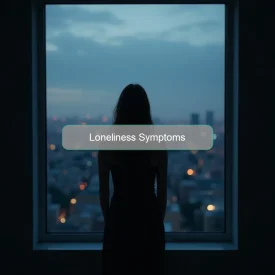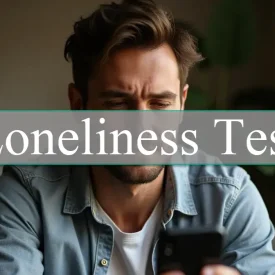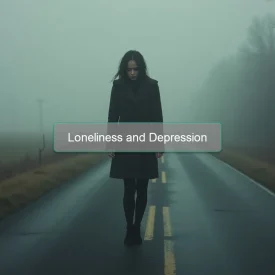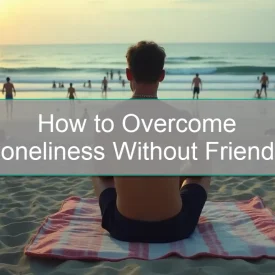Breaking up is one of the hardest things you can go through, and feeling lonely afterward is almost inevitable. Breakups can bring a lot of emotional pain and make you feel less happy with life. They can also change how you see yourself, as the daily habits and identity you shared with your partner come to an end.
It’s not just losing a partner—you’re losing daily moments of connection, shared routines, and emotional support all at once. This sudden silence can feel crushing, leaving you wondering why loneliness after a breakup feels so overwhelming.
The good news? While loneliness after a breakup is very common, it doesn’t have to control your life. By understanding the reasons behind these feelings and discovering healthy ways to cope, you can start healing, regain your strength, and build a fulfilling life beyond the breakup.
Key Takeaways
- Loneliness after a breakup goes beyond sadness — it’s not just grief, but a deeper emptiness tied to the loss of daily connection and support.
- Psychological and biological factors play a role, from attachment styles to changes in brain chemistry that intensify feelings of isolation.
- Breakup loneliness affects mind and body, showing up as emotional emptiness, unhealthy coping behaviors, fatigue, and sleep issues.
- Healthy coping strategies make recovery possible, including journaling, routines, hobbies, support networks, and time in nature.
- With patience and self-compassion, loneliness can become growth, leading to greater independence, stronger friendships, and readiness for healthier future relationships.
Understanding Loneliness After a Breakup
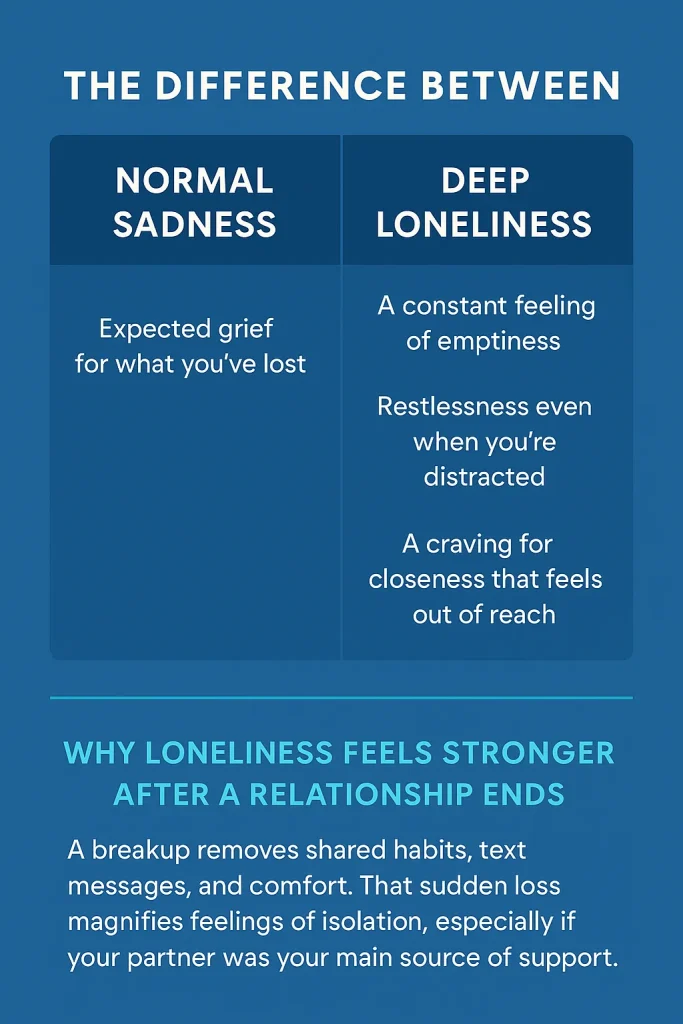
To truly manage loneliness after a breakup, it helps to understand what this feeling really means and how it differs from other emotions you may experience.
What Does “Lonely After Breakup” Really Mean?
Loneliness after a breakup refers to the deep sense of emptiness you feel when the person who once filled your emotional space is no longer there. It’s not just about missing your ex—it’s about missing connection, routine, and the sense of being “seen.”
In simple terms: feeling lonely after a breakup is your mind and body adjusting to sudden silence where closeness used to be.
The Difference Between Normal Sadness and Deep Loneliness
Sadness after a breakup is expected—it’s grief for what you’ve lost. But loneliness goes deeper. It lingers beyond tears, showing up as:
- A constant feeling of emptiness
- Restlessness even when you’re distracted
- A craving for closeness that feels out of reach
This deeper loneliness often peaks after the initial shock fades, marking a significant phase in breakup recovery. Recognizing this can help you give yourself patience and space to heal.
Why Loneliness Feels Stronger After a Relationship Ends
You might ask, “Why do I feel lonely after a breakup?” The answer lies in how relationships shape daily life. A breakup removes shared habits, text messages, and comfort. That sudden loss magnifies feelings of isolation, especially if your partner was your main source of support.
Common Emotional Reactions After a Breakup

Breaking a relationship disrupts your daily emotional rhythms and social structure. These changes often trigger emotional responses such as:
Missing the Small Daily Moments
One of the hardest parts is no longer having those small daily talks—like chatting before bed or sharing little updates. Without them, life can feel strangely quiet. Without it, life can feel strangely quiet.
Not Recognizing Yourself
Breakups can shake your sense of self. If you tied your identity to the relationship, you may feel unsure about finding yourself after a breakup.
Feeling Alone When Friends Change
You might also face breakup loneliness at night, when distractions fade. Friendships may shift if they were shared with your ex, adding another layer of isolation.
Psychological Reasons You Feel Lonely After a Breakup
Beyond emotions, psychological and biological factors make loneliness after a breakup complex and unique for each person.

Attachment Styles and Post-Breakup Loneliness
People have different ways of forming emotional bonds, called attachment styles. If you have an anxious attachment style, you might feel a strong need for closeness and worry a lot about being alone after a breakup.
On the other hand, if you have an avoidant attachment style, you may try to ignore or deny your feelings at first, but that can lead to loneliness later on. Understanding your attachment style helps explain why some people find it harder or easier to recover from a breakup.
The Role of Brain Chemistry and Hormones
When you’re in love, your brain releases chemicals like dopamine and oxytocin that make you feel happy and connected. Dopamine gives you pleasure and motivation, while oxytocin builds trust and closeness.
After a breakup, the levels of these “feel-good” chemicals drop suddenly. This creates a kind of withdrawal, similar to breaking a habit, which makes feelings of loneliness stronger and even painful. This biological change helps explain the deep ache you might feel.
Breakup Loneliness vs. Clinical Depression
It’s important to know the difference between normal loneliness after a breakup and clinical depression. Loneliness is a natural, temporary feeling that comes from losing someone important.
Clinical depression, however, is a medical condition that lasts longer and affects your mood, energy, and body. It can cause feelings of hopelessness, difficulty in daily activities, and physical symptoms like changes in appetite or sleep.
Recognizing these differences ensures you get the right support when you need it.
Signs That Loneliness Is Affecting You Deeply
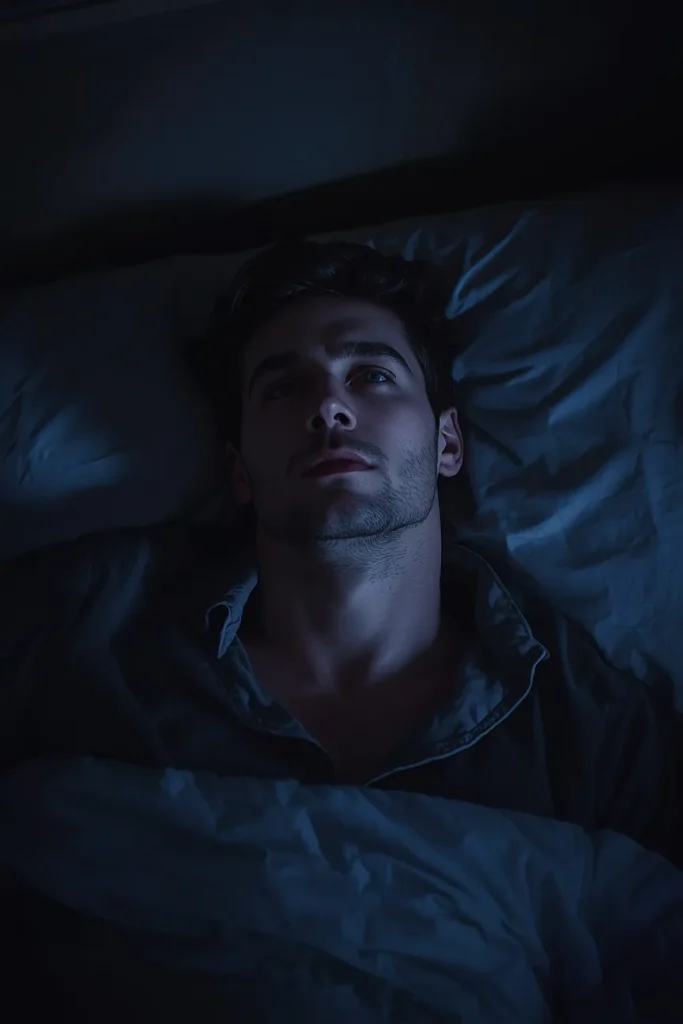
If loneliness lingers or worsens, it can impact your emotional, behavioral, and physical health in clear ways.
Recognizing the signs of loneliness can help you take the right steps. For more on the common symptoms of loneliness and what it feels like to be feeling lonely, these articles offer clear guidance.
Emotional Symptoms (e.g., emptiness, hopelessness)
You may cycle through the stages of loneliness after a breakup—emptiness, sadness, longing, and frustration. If these feelings don’t ease over time, they may need closer attention.
For example, one reader shared how, after her breakup, she felt waves of emptiness even when surrounded by friends. She noticed herself scrolling endlessly through social media at night, searching for connection.
Over time, she began journaling each evening and taking short walks outdoors, which slowly helped her feel grounded again. Looking back, she realized the loneliness was temporary, and small daily steps eventually gave her a sense of balance and hope.
Behavioral Symptoms (e.g., withdrawal, unhealthy coping)
If you notice yourself avoiding people, overusing social media, or turning to unhealthy habits, it may be a sign that coping with breakup loneliness is becoming difficult.
Physical Symptoms (e.g., fatigue, trouble sleeping)
Loneliness after a breakup can affect your body, causing problems like trouble sleeping, feeling tired, or having tension headaches due to ongoing stress. Recognizing these signs early helps you take action before things worsen.
Coping Strategies to Overcome Loneliness After a Breakup

Knowing why loneliness happens leads naturally to asking, “How do I heal from this loneliness after a breakup?” The following strategies can guide your recovery.
Let Yourself Feel and Grieve
The first step in how to deal with loneliness after breakup is accepting your feelings. Suppressing grief only prolongs it. Give yourself permission to cry, reflect, and heal.
Reach Out to Friends and Family
Don’t isolate yourself. Reach out to loved ones or join breakup support groups. Having people remind you of your worth speeds up healing.
➡️ Follow your own advice: Accept help when it’s offered and stay connected.
Keep a Regular Routine and Take Care of Yourself
Structure creates stability. Prioritize sleep, balanced meals, and exercise—classic breakup self-care tips that reduce emotional stress.
Write Down Your Feelings
Journaling after a breakup helps process emotions. Writing what you feel makes it easier to release pain and track your healing progress.
Try New Hobbies and Interests
Distraction isn’t avoidance—it’s healing. Exploring new activities provides healthy distractions after breakup and rebuilds your sense of joy.
Get Outside and Spend Time in Nature
Fresh air and sunlight can lift your mood and reduce feelings of loneliness. Even a short walk in a park or natural setting helps clear your mind and refresh your spirit.
Set Small Goals Every Day
Having small, achievable goals gives you a sense of purpose and progress. Whether it’s cleaning a room, cooking a meal, or reading a few pages of a book, these little wins support your healing journey.
Using AI Companions for Support
Some people find comfort in technology-based support like an AI girlfriend — digital companions designed to provide emotional connection when loneliness feels overwhelming. To learn more about these AI companions, see What is an AI girlfriend.
Healthy Ways to Reframe Loneliness

Loneliness after a breakup doesn’t have to be only painful — it can also be a doorway to growth and self-discovery.
Turning Alone Time Into Personal Growth
Use this time to focus on turning loneliness into self-growth. Try learning new skills, setting personal goals, and finding yourself after a breakup.
Practicing Mindfulness and Self-Compassion
Daily meditation, deep breathing, or guided affirmations support mindfulness for breakup recovery. Speak to yourself kindly, as you would a friend.
Learning to Enjoy Solitude Without Feeling Isolated
Enjoying solitude after a breakup doesn’t mean you ignore your feelings. It means embracing quiet time as a chance to recharge and discover independence. This shift turns loneliness into strength.
When to Seek Extra Help
Sometimes loneliness is a warning sign for deeper emotional needs.
Signs You Might Need Professional Support
If loneliness turns into hopelessness or you struggle for months, it’s time to ask: “Is this when to seek help after a breakup?” The answer is yes—seeking support is strength, not weakness.
How Therapy Can Help With Breakup Loneliness
Therapy for breakup loneliness gives you tools to rebuild confidence, manage emotions, and understand your patterns in relationships.
Support Groups and Online Communities
Joining online communities for breakup recovery can provide comfort and remind you that you’re not alone. Shared stories often bring perspective and hope.
Preventing Future Loneliness After Breakups
Healing after a breakup includes preparing for healthier emotional independence in the future.
Embracing single life can be challenging yet rewarding. If you find yourself single and lonely, learning how to rediscover joy and connection is key.
Building Stronger Emotional Independence
Work on overcoming loneliness weeks after breakup by strengthening your self-reliance now—so future separations don’t feel as destabilizing.
Strengthening Friendships Beyond Romantic Bonds
Maintaining strong friendships ensures you’re not overly dependent on one person. This is key for moving on from breakup loneliness.
Entering New Relationships From a Healthy Place
Before dating again, focus on rebuilding life after breakup loneliness. A healthier sense of self means stronger, more balanced future relationships.
Moving Forward with Hope and Strength
Loneliness after a breakup is difficult but temporary. Most people experience it, and with time, self-care, and support, those feelings ease. By accepting your emotions, reaching out to others, and focusing on personal growth, you can heal and rediscover joy. Remember, every ending paves the way for a new beginning — one where you grow stronger, more independent, and ready for healthier connections in the future.
Disclaimer
This article is for informational and educational purposes only. It is not a substitute for professional medical advice, diagnosis, or treatment. If feelings of loneliness or sadness after a breakup persist or become overwhelming, consider reaching out to a licensed mental health professional for support.
Frequently Asked Questions
How long does loneliness after a breakup usually last?
Loneliness can last from a few weeks to several months. Healing takes time, and feelings often improve within 3 to 6 months as you adjust and recover.
Can AI companions really help with breakup loneliness?
Yes, AI companions can offer comfort and conversation when feeling lonely. They help some people feel supported, but should not replace a real human connection.
How do I know if breakup loneliness is a sign of depression?
If loneliness is constant, overwhelming, or comes with hopelessness, loss of interest, or changes in sleep and appetite, it may be depression. Seeking professional help is important.



